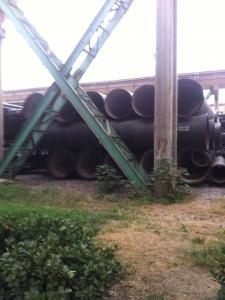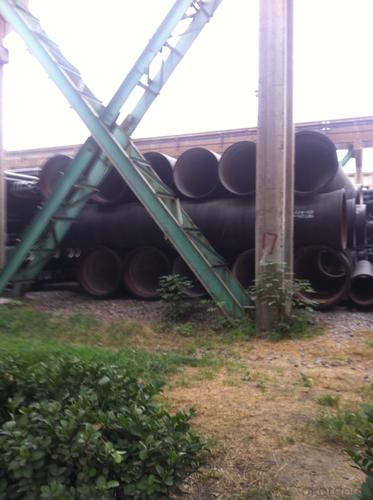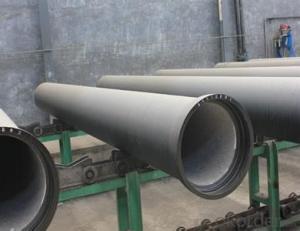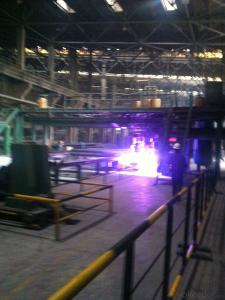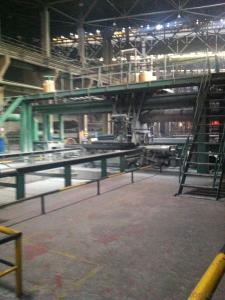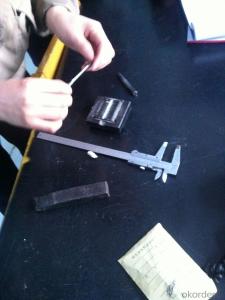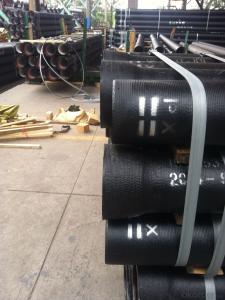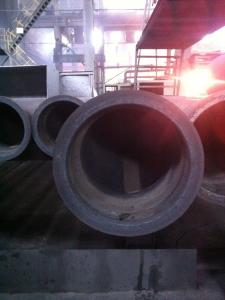DUCTILE IRON PIPE AND PIPE FITTINGS K8 CLASS DN600
- Loading Port:
- Tianjin
- Payment Terms:
- TT OR LC
- Min Order Qty:
- 23 pc
- Supply Capability:
- 3000 pc/month
OKorder Service Pledge
OKorder Financial Service
You Might Also Like
Material : Ductile Cast Iron
Size Range : DN 80mm to DN 2000mm
Unit Effective Length : 6m or 5.7m
Manufacture Standard: ISO 2531:1998/ EN 545:2006/EN 598:2007
Annual capacity : 200,000 tons
Coating Exterior: Zinc 130g/m2 according to ISO 8179-1 and bitumen coating 70 microns.
Cement Interior: Portland Cement/ High Alumina Cement/ Sulphate Resisting Cement Lining according to ISO 4179
Special requirements on external coating and internal lining can be applied
We also provide accessories such as SBR/EPDM rubber gaskets, lubricant paste, pipe caps, PE sleeves, etc.
Additional Parts:
Each pipe is strictly inspected according to related standard to ensure permanently high performance.
Easy Installation at site and service free for life
Long Service Lifespan
Quotation will arrive you within 24hours once we get your inquiry.
We guarantee offering you a competitive price.
A copy of original inspection reports of pipes will be offered after shipment.
Photos of loading process will be sent to the customer after shipment effect.
We will follow-up the delivery progress after shipment effect and update to the customer on weekly basis.
- Q: What are the different types of ductile iron pipe joints?
- Various applications commonly utilize different types of ductile iron pipe joints to ensure efficient fluid transfer and prevent leaks. These joints provide strong and reliable connections between pipes. Some of the most frequently used types of ductile iron pipe joints are as follows: 1. Push-on Joint: This joint is simple to install and does not require any special tools. The spigot end of one pipe is inserted into the bell end of another pipe, creating a tight seal. A rubber gasket is typically used to enhance leak resistance. 2. Mechanical Joint: Water and wastewater applications often use mechanical joints. They consist of a gland, a rubber gasket, and a follower gland. The pipe ends are pushed into the gland, and the follower gland is tightened, compressing the rubber gasket and establishing a secure connection. 3. Restrained Joint: These joints are designed to withstand high internal and external forces, such as water pressure or soil loadings. Rubber gaskets and restraining mechanisms like bolts or wedges are commonly used to prevent pipe movement or separation under stress. 4. Flanged Joint: Large diameter pipes or applications requiring frequent disassembly often employ flanged joints. Each pipe end is equipped with a flange, which is then bolted together with gaskets to create a strong connection. Flanged joints provide convenient access for maintenance or repairs. 5. Welded Joint: Welded joints involve heating and fusing the pipe ends to form a permanent connection. This type of joint is typically used in high-pressure applications where a reliable and leak-free connection is crucial. Skilled labor and specialized equipment are required for welded joints. To ensure the integrity and longevity of the ductile iron pipe system, it is important to choose the appropriate joint based on the specific application, pipe size, and operating conditions. Consulting with a professional engineer or pipe manufacturer can help determine the most suitable joint for a particular project.
- Q: Does centrifugal cast iron pipe work well with lining cement? Will it scale and breed bacteria?
- Poor hydraulic performance and high energy consumption. The roughness coefficient of the prestressed reinforced concrete pipe is between 0.013 - 0.014, so that the pipeline resistance of the pipeline with the same pipe diameter is higher than that of the same water content. Because of its high roughness, after a period of use, the pipeline will be blocked by bacteria, shellfish breeding and reproduction. As the service life increases, the inner diameter of the pipe will gradually shrink and the resistance will increase.
- Q: How does ductile iron pipe handle traffic loads and vibrations?
- Ductile iron pipe is known for its excellent strength and flexibility, allowing it to efficiently handle traffic loads and vibrations. Its superior durability and resilience enable it to withstand heavy vehicle traffic without experiencing significant deformation or damage. Additionally, the material's inherent vibration-damping properties help to minimize the transmission of vibrations caused by traffic, ensuring a smoother and quieter flow of traffic. Overall, ductile iron pipe is a reliable and robust choice for managing traffic loads and vibrations effectively.
- Q: Can ductile iron pipes be used in contaminated groundwater systems?
- Contaminated groundwater systems can indeed utilize ductile iron pipes. Renowned for their strength and durability, ductile iron pipes are versatile and applicable in various settings, including water and wastewater systems. These pipes possess corrosion-resistant properties that safeguard against both internal and external corrosion, thus ensuring reliable water transportation, even in the presence of contaminated groundwater. When addressing contaminated groundwater, it becomes imperative to assess the extent and nature of the contamination. Ductile iron pipes exhibit resistance to numerous common chemicals typically found in groundwater, including specific acids and alkalis. However, in instances of severe or specific chemical contamination, it may be necessary to explore alternative pipe materials that offer superior resistance to those particular substances. Moreover, the proper installation and maintenance of ductile iron pipes are vital for their long-term performance within contaminated groundwater systems. Regular inspections, cleaning, and the use of suitable protective coatings can effectively mitigate any potential risks associated with contamination. In conclusion, ductile iron pipes can be effectively employed in contaminated groundwater systems, provided that the level and type of contamination fall within acceptable limits and appropriate installation and maintenance practices are observed. It is always advisable to seek guidance from experts and consider local regulations and guidelines when determining the suitability of pipe materials in specific groundwater systems.
- Q: Can ductile iron pipes be used in areas with high groundwater levels?
- Indeed, areas with high groundwater levels can accommodate the use of ductile iron pipes. Renowned for their robustness, endurance, and anti-corrosion properties, these pipes prove themselves suitable for diverse purposes, such as water supply systems. Their structural integrity remains intact even when confronted with elevated groundwater levels. Additionally, the smooth interior surface of ductile iron pipes aids in sustaining optimal flow capacity while minimizing the likelihood of blockages or sediment accumulation. Thus, they offer a dependable option for regions with considerable groundwater levels, ensuring a durable and effective resolution for water distribution systems.
- Q: Are ductile iron pipes suitable for bridge piers or abutments?
- Ductile iron pipes are indeed appropriate for bridge piers or abutments. This material, known for its strength and durability, is extensively utilized in diverse infrastructure undertakings, such as bridges. It possesses exceptional mechanical characteristics, including remarkable tensile strength and impact resistance, rendering it capable of withstanding substantial loads and external forces. Moreover, ductile iron pipes exhibit high resistance to corrosion and enjoy a lengthy service life, which is crucial for structures like bridge piers or abutments that face harsh environmental conditions. The adaptability and dependability of ductile iron pipes deem them a fitting choice for supporting and fortifying bridge structures, ensuring their safety and longevity.
- Q: Can ductile iron pipe be used for industrial applications?
- Yes, ductile iron pipe can be used for industrial applications. Ductile iron pipe is known for its strength, durability, and flexibility, making it suitable for a wide range of industrial settings. It is commonly used for transporting water, wastewater, and other fluids in industrial facilities such as power plants, chemical plants, refineries, and manufacturing plants. Ductile iron pipe is resistant to corrosion, which is important in industrial environments where the pipes may be exposed to chemicals, high temperatures, or abrasive materials. Additionally, its high tensile strength allows it to withstand high-pressure applications, making it ideal for industrial use. Overall, ductile iron pipe is a reliable and cost-effective choice for various industrial applications.
- Q: What is the minimum cover requirement for ductile iron pipes?
- The specific project or engineering design considerations typically determine the minimum cover requirement for ductile iron pipes. However, as a general rule, it is often recommended to have a minimum cover requirement of at least 2 feet (or 0.6 meters) from the top of the pipe to the finished ground surface. This recommendation helps protect the pipe from external loads, soil settlement, and potential damage during construction activities. Additionally, it contributes to the long-term structural integrity and durability of the ductile iron pipe system. It is crucial to consult local building codes, industry standards, and project specifications for accurate and up-to-date information on specific minimum cover requirements.
- Q: What kind of valves are commonly used in ductile iron pipes?
- You ask the ductile cast iron valves used on no special, because this interface in connection with the valve on the pipe flange is basically, as long as the flange of the valve should be can be used in milling pipe.
- Q: Can ductile iron pipe be used for stormwater management systems?
- Ductile iron pipe is indeed suitable for stormwater management systems. It finds extensive use in diverse applications, such as stormwater drainage systems. Its exceptional attributes encompass robustness, longevity, and resistance against corrosion, rendering it highly capable of enduring the challenging conditions inherent in stormwater management. Furthermore, the installation and maintenance of ductile iron pipe are effortless, thus making it a cost-efficient selection for stormwater management systems. In summary, ductile iron pipe emerges as a dependable and fitting alternative for the construction of stormwater management systems.
Send your message to us
DUCTILE IRON PIPE AND PIPE FITTINGS K8 CLASS DN600
- Loading Port:
- Tianjin
- Payment Terms:
- TT OR LC
- Min Order Qty:
- 23 pc
- Supply Capability:
- 3000 pc/month
OKorder Service Pledge
OKorder Financial Service
Similar products
Hot products
Hot Searches
Related keywords
